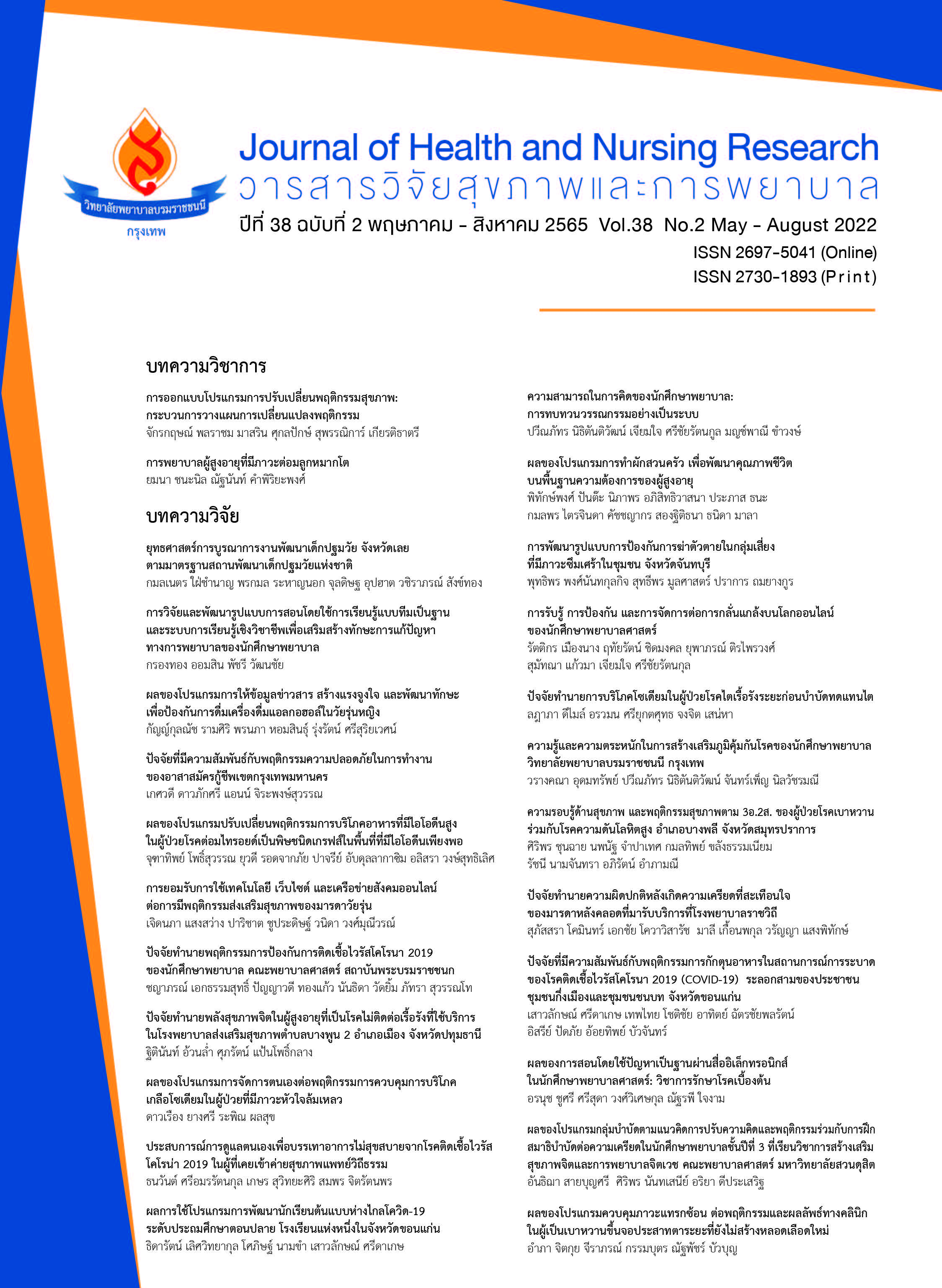ผลของการสอนโดยใช้ปัญหาเป็นฐานผ่านสื่ออิเล็กทรอนิกส์ในนักศึกษาพยาบาลศาสตร์: วิชาการรักษาโรคเบื้องต้น
คำสำคัญ:
สื่ออิเล็กทรอนิกส์ , การเรียนโดยใช้ปัญหาเป็นฐาน , นักศึกษาพยาบาลศาสตร์ , การคิดวิเคราะห์บทคัดย่อ
บทนำ: การเรียนการสอนโดยใช้ปัญหาเป็นฐานเป็นวิธีการจัดการเรียนการสอนที่ทำให้ผู้เรียนได้เรียนรู้ด้วยตนเองและได้พัฒนาการคิดเชิงวิเคราะห์
วัตถุประสงค์การวิจัย: เพื่อศึกษาผลของการเรียนการสอนโดยใช้ปัญหาเป็นฐานผ่านสื่ออิเล็กทรอนิกส์ที่มีผลต่อความสามารถด้านการคิดวิเคราะห์และความคิดเห็นของนักศึกษาต่อการเรียนการสอนผ่านสื่ออิเล็กทรอนิกส์ ในรายวิชาการรักษาโรคเบื้องต้นของนักศึกษาพยาบาลศาสตร์
ระเบียบวิธีวิจัย: การวิจัยครั้งนี้เป็นการวิจัยกึ่งเชิงทดลอง โดยใช้รูปแบบกลุ่มเดียว ทดสอบก่อนและหลังการทดลอง (One Group Pretest Posttest Design) กลุ่มตัวอย่างเป็นนักศึกษาพยาบาล ชั้นปีที่ 3 คณะพยาบาลศาสตร์ มหาวิทยาลัยสวนดุสิต ที่ลงทะเบียนเรียนวิชาการรักษาโรคเบื้องต้น ปีการศึกษา 2563 จำนวน 85 คน เรียนออนไลน์เป็นระยะเวลา 6 สัปดาห์ เครื่องมือที่ใช้ในการวิจัย ได้แก่ แบบวัดความสามารถด้านการคิดวิเคราะห์ และแบบสอบถามความคิดเห็นของนักศึกษาเกี่ยวกับการเรียนการสอนผ่านสื่ออิเล็กทรอนิกส์ วิเคราะห์ข้อมูลด้วยค่าเฉลี่ย ส่วนเบี่ยงเบนมาตรฐาน และสถิติทดสอบแพร์ที (Paired t - test)
ผลการวิจัย: 1. ภายหลังการสอนโดยใช้ปัญหาเป็นฐานผ่านสื่ออิเล็กทรอนิกส์มีคะแนนเฉลี่ยของความสามารถด้านการคิดวิเคราะห์สูงกว่าก่อนการใช้รูปแบบการสอนอย่างมี นัยสำคัญทางสถิติที่ระดับ .05(t = -20.01, p = .00) 2. นักศึกษามีความความคิดเห็นต่อกิจกรรมการสอนผ่านสื่ออิเล็กทรอนิกส์จากสถานการณ์ที่กำหนดให้กระตุ้นให้นักศึกษาใช้ความรู้เดิมหรือที่เคยเรียนมาในระดับมาก (mean = 4.69, SD = 0.59)
สรุปผลการวิจัย: ผลการศึกษาครั้งนี้ชี้ให้เห็นว่าการสอนโดยใช้ปัญหาเป็นฐานผ่านสื่ออิเล็กทรอนิกส์ สามารถเพิ่ม ความสามารถ ด้านการคิดวิเคราะห์ในนักศึกษาพยาบาลได้
ข้อเสนอแนะ: การจัดการเรียนรู้สำหรับการสอนโดยใช้ปัญหาเป็นฐาน ประกอบด้วยกิจกรรมการเรียนรู้อย่างต่อเนื่องเพื่อพัฒนาการเรียนรู้การคิดอย่างมีวิจารณญาณ ซึ่งนำไปสู่การเรียนรู้ตลอดชีวิต
Downloads
เอกสารอ้างอิง
Office of the Education Council. National education plan 2017-2036 [Internet]. 2018 [cited 2021 Mar 27]. Available from: http://www.onec.go.th/1540-file.pdf.
Panich V. Building professional learning for the 21st century skills. Bangkok: Tathata Publication; 2012. (In Thai)
Savery JR. Overview of problem-based learning: Definitions and distinctions. The Interdisciplinary Journal of Problem-based Learning 2006;1(1): 8-20.
Ates O, Eryilmaz A. Factors affecting performance of tutors during problem-based learning implementations. Procedia-Social and Behavioral Sciences 2010;2(2):2325-9.
William SM., Beattie HJ. Problem based learning in clinical setting – A systematic review. Nursing Education Today 2008; 28: 146-154.
Phongphaew N, Jiamsanguanwong A, editors. Usability evaluation on learning management system. International Conference on Applied Human Factors and Ergonomics. Springer; 2017.
Chusri O, Jaingam N, Marapen R, Wongwiseskul S, Jermrod P, Chonmasuk J. The relationships between learning styles, critical thinking deposition and academic achievement in nursing students. NJPH 2021;30(2):105-115.
Norman GR., Schmidt HG. Effectiveness of problem-based learning curricula: theory, practice and paper darts. Medical Education 2000; 34:721–728.
Chusri O, Jaingam N,Marapen R, Wongwiseskul S, Jermrod P, Chonmasuk J. The effects of teaching model of problem-based learning on analytical thinking ability in 3rd year nursing students: Suan Dusit University 2020.(Non Publication)
Thongmeekhaun T, Kitrungroj T, Chunpradub P.The Effect of seminar teaching method on learning achievement of participants of the Nursing Specialty in Nurse Practitioner (Primary Medical Care) Program for the topic of the primary medical care of patients with dyspnea syndrome. Nursing Journal of The Ministry of Public Health 2016; 25(3):132-143.
Race P, Brown S Smith B. 500 tips on assessment. 2nd ed. London: Routledge; 2005.
Rusdi SH, Umar IN. Students’ levels of critical thinking, supportive behaviors and types of questions in an online forum learning environment. Procedia-Social and Behavioral Sciences 2015;197:1752-8.
Swart R. Critical thinking instruction and technology enhanced learning from the student perspective: A mixed methods research study. Nurse Education in Practice 2017; 23:30-9.
Plachai W, & Phengpinyo W. The development online lessons mobile learning using problem-based learning with collaborative learning techniques about website programming for grade 12 students of SRIPRACHAN “METHIPRAMUK” school. Journal for social sciences research 2019;10(1):186-200.
Suttisakda N. The comparison of academic achievements for a subject on webpage writing by Prathom 6 students with the use of Computer-Assisted Instruction and Regular Learning. HAT YAI university 2010; 368-79. (in Thai).
Hussin W, Harun J, Shukor NA. Problem based learning to enhance students critical thinking skill via online tools. Asian Social Science 2019;15(1):14-23.
Phungsuk R, Viriyavejakul C, Ratanaolarn T. Development of a problem-based learning model via a virtual learning environment. Kasetsart Journal of Social Sciences 2017;38(3):297-306.
Gündüz AY, Alemdag E, Yasar S, Erdem M. Design of a Problem-Based online learning environment and evaluation of its effectiveness. Turkish Online Journal of Educational Technology-TOJET 2016;15(3):49-57.
Sirisupluxana P. Teaching nursing students to develop critical thinking skills. The Journal of Boromarajonani College of Nursing, Nakhonratchasima 2013;19(2):5-19. (In Thai)
Clark CM, Ahten SM, Macy R. Using problem-based learning scenarios to prepare nursing students to address incivility. Clinical Simulation in Nursing 2013;9(3):e75-e83.
Merisier S, Larue C, Boyer L. How does questioning influence nursing students' clinical reasoning in problem-based learning? A scoping review. Nurse education today 2018;65: 108-15.
Choi H. A problem-based learning trial on the Internet involving undergraduate nursing students. J Nurs Educ 2003;42(8):359-63.
Şendağ S, Odabaşı HF. Effects of an online problem-based learning course on content knowledge acquisition and critical thinking skills. Computers & Education 2009;53(1):132-41.
Dhabdhimsri V, Naiyapatana O. Enhancing thinking process skills in adults nursing using problem-based learning. Journal of Boromarajonani College of Nursing, Bangkok 2017;33(1):104-114. (in Thai)
ดาวน์โหลด
เผยแพร่แล้ว
รูปแบบการอ้างอิง
ฉบับ
ประเภทบทความ
สัญญาอนุญาต
ลิขสิทธิ์ (c) 2022 วารสารวิจัยสุขภาพและการพยาบาล (วารสารวิทยาลัยพยาบาลบรมราชชนนี กรุงเทพ)

อนุญาตภายใต้เงื่อนไข Creative Commons Attribution-NonCommercial 4.0 International License.
บทความที่ได้รับการตีพิมพ์ เป็นลิขสิทธิ์ของวารสารวิจัยสุขภาพและการพยาบาล (วิทยาลัยพยาบาลบรมราชชนนี กรุงเทพ) ไม่สามารถนำไปตีพิมพ์ซ้ำในวารสารฉบับอื่น


















